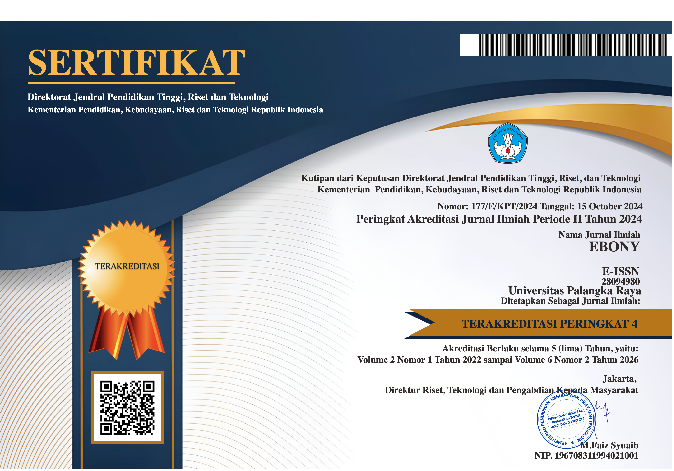Enhancing Reading Comprehension Among Informatics Management Students through the Grammarian Android Game: A Classroom Action Research
DOI:
https://doi.org/10.37304/ebony.v4i2.13944Keywords:
android games, reading, grammarian, ESPAbstract
This research investigates the effectiveness of the Grammarian Android Game in improving the reading comprehension skills of third-semester Informatics Management students at Piksi Input Serang Polytechnic. The study adopts a Classroom Action Research (CAR) methodology, conducted in two cycles, involving 28 students. Initial observations indicated significant challenges in reading comprehension, with most students scoring below the required competency level. The introduction of the Grammarian Android Game aimed to address these challenges by providing an interactive and engaging learning tool. Results showed substantial improvements in students' reading comprehension scores, increasing from an average of 60.72 in the pre-cycle to 92.21 in the second cycle. The iterative process of planning, acting, observing, and reflecting facilitated continuous improvement in teaching strategies, leading to enhanced student engagement and understanding. The study concludes that the Grammarian Android Game is an effective tool for enhancing reading comprehension, making the learning process more enjoyable and effective. This research contributes to the understanding of digital game-based learning's impact in higher education, particularly in technical fields.Downloads
References
Baron, N. (2021). How we read now: Strategic choices for print, screen, and audio. Oxford University Press.
Basuki, S. (2018). Applying scanning and skimming skills to understand life skills reading. Journal of English Language and Literature (JELL), 3(01), 129–142.
Davis, K., Sridharan, H., Koepke, L., Singh, S., & Boiko, R. (2018). Learning and engagement in a gamified course: I nvestigating the effects of student characteristics. Journal of Computer Assisted Learning, 34(5), 492–503.
El-Magd, A., & Mohammad, M. A. E.-M. (2022). Text Chatbot Assisted Edublogs for Enhancing the EFL Technical Writing Performance among Computer and Informatics Students., 46(2), 99–145.
El-Sabagh, H. A. (2021). Adaptive e-learning environment based on learning styles and its impact on development students’ engagement. International Journal of Educational Technology in Higher Education, 18(1), 53.
Elaish, M. M., Ghani, N. A., Shuib, L., & Al-Haiqi, A. (2019). Development of a mobile game application to boost students’ motivation in learning English vocabulary. IEEE Access, 7, 13326–13337.
Hedgcock, J. S., & Ferris, D. R. (2018). Teaching readers of English: Students, texts, and contexts. Routledge.
Hernandez-de-Menendez, M., Morales-Menendez, R., Escobar, C. A., & McGovern, M. (2020). Competencies for industry 4.0. International Journal on Interactive Design and Manufacturing (IJIDeM), 14, 1511–1524.
Jainal, N. H., & Shahrill, M. (2021). Incorporating Jigsaw Strategy to Support Students’ Learning through Action Research. International Journal on Social and Education Sciences, 3(2), 252–266.
Kemmis, S., McTaggart, R., & Nixon, R. (2016). The Action Research Planner: Doing Critical Participatory Action Research. Springer Singapore. https://books.google.co.id/books?id=mYVivgAACAAJ
Kurniati, E. (2018). Game on android app in support the students’english learning. Proceedings of ISELT FBS Universitas Negeri Padang, 6, 84–90.
Lauder, A. F. (2020). English in Indonesia. The Handbook of Asian Englishes, 605–627.
Liu, X., & Moeller, A. J. (2019). Promoting learner engagement through interactive digital tools.
Mardianti, N., Wijayati, P. H., & Murtadho, N. (2021). The correlation between students’ reading anxiety and their reading comprehension in ESP context. International Journal of Language Education, 5(2), 15–29.
Megawati, F., & Sultoni, S. (2016). Android based educational game in Indonesian TEYL.
Miles, M. B., Huberman, A. M., & Saldaña, J. (2020). Qualitative Data Analysis: A Methods Sourcebook (Issue v. 14). SAGE. https://books.google.co.id/books?id=oMT6wQEACAAJ
Ngoi, S., Tan, K. H., & Jamsari Alias, N. M. (n.d.). Digital Storytelling to Improve English Narrative Writing Skills.
Nurchintyawati, I. (2022). Android based educational game in learning and teaching English vocabulary. Journal of Applied Linguistics, 1(2), 13–18.
Pateşan, M., Balagiu, A., & Alibec, C. (2018). Visual aids in language education. International Conference Knowledge-Based Organization, 24(2), 356–361.
Purgina, M., Mozgovoy, M., & Blake, J. (2020). WordBricks: Mobile technology and visual grammar formalism for gamification of natural language grammar acquisition. Journal of Educational Computing Research, 58(1), 126–159.
Purwanto, M. B., Hartono, R., & Wahyuni, S. (2023). Essential skills challenges for the 21st century graduates: Creating a generation of high-level competence in the industrial revolution 4.0 era. Asian Journal of Applied Education (AJAE), 2(3), 279–292.
Sasabone, L., & Pongpalilu, F. (2022). Improving Students’ Reading Comprehension of English for Specific Purposes (ESP) at UKI Paulus Makassar. EDULEC: Education, Language, and Culture Journal, 2(1), 87–93.
Serrano, D. R., Dea‐Ayuela, M. A., Gonzalez‐Burgos, E., Serrano‐Gil, A., & Lalatsa, A. (2019). Technology‐enhanced learning in higher education: How to enhance student engagement through blended learning. European Journal of Education, 54(2), 273–286.
Shirinova, N. (2018). Using games in teaching english vocabulary for students of engineering. Irrigatsiya va Meliоratsiya, 3, 89–92.
Sukmawati, N. N., & Nasution, S. S. (2020). Genre-Based Approach: Can It Improve the Informatics Engineering Students’ Writing Skill? JEES (Journal of English Educators Society), 5(1), 95–102.
Tarrayo, V. N., Hernandez, P. J. S., & Claustro, J. M. A. S. (2020). Teachers and research practices: Perspectives from English language educators in a Philippine university. Australian Journal of Teacher Education (Online), 45(12), 73–90.
Vedadi, S., Abdullah, Z. B., & Cheok, A. D. (2019). The effects of multi-sensory augmented reality on students’ motivation in English language learning. 2019 IEEE Global Engineering Education Conference (EDUCON), 1079–1086.
Yamao, S., & Sekiguchi, T. (2015). Employee commitment to corporate globalization: The role of English language proficiency and human resource practices. Journal of World Business, 50(1), 168–179.
Downloads
Published
How to Cite
Issue
Section
License
Copyright (c) 2024 Romadhon

This work is licensed under a Creative Commons Attribution 4.0 International License.











